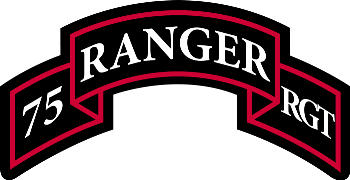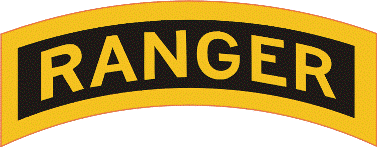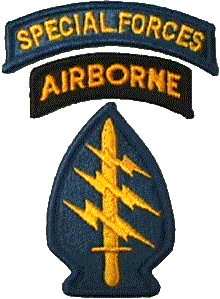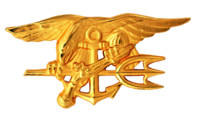US Military Special Operations
2015-02-03 Updated
2010-04-16 Initial Post
Within the last few months I renewed my interest in US military special operations, particularly from watching the Military Channel's Special Ops Mission and sniper shows, and the Discovery Channel's Two Weeks In Hell and Surviving the Cut. I’m writing this post to gather my notes on spec ops units in the US military.
The furthest that I made it in the military was as an E-2 Private in the Army Reserve. My MOS was 91B (Medical Specialist). That doesn't qualify me to be a military or special ops expert, but at least it gives me a clue.
There will always be debates about which spec ops unit is the toughest, etc. The fact is, the requirements for any spec ops unit are more demanding than the average person could even handle one day of. And they all have specific missions, so one unit is not better at everything. In my opinion, if I was in a war zone and needed to evade the enemy and live off the land, I would prefer to have a Green Beret helping me out. If I was a hostage on a ship, I’d definitely want a SEAL team to rescue me.
The point of spec ops and what makes them stand out is their determination and will to succeed. It’s not about kicking down a door and shooting a bad guy because any grunt could do that. I think it’s plausible that one could be in spec ops for a few years and never see real combat or actually kill anyone. A spec ops soldier must be able to endure thirst, hunger, heat, cold, pain, whatever, to accomplish the mission. They will succeed when others can’t or won’t, so that’s what really sets them apart.
A misconception is the term "special forces" in the context of the US military. That term is technically the official name of the Green Berets, which is US Army Special Forces. The term "special operations" basically refers to any military unit that conducts unconventional operations. The US Army Special Forces, along with units from other branches, are considered "special operations."
Some police departments also have units that contain the term "special operations." Those police units are equivalent to police SWAT (Special Weapons and Tactics) units. Whatever the context, "special operations" are units that are more highly trained and are able to conduct operations that conventional units are not capable of. For the purpose of this article, special operations refers to units that fall within the US Department of Defense's US Special Operations Command.
Several countries around the world have special operations units whose training and requirements are just as tough as those of the US military's. As a matter of fact, some of the US spec ops units were modeled after those of UK spec ops units (Special Air Service). Sometimes we think that America has the toughest military training, but check out Royal Thai Marine Corps Recon (https://www.youtube.com/watch?v=l6Y9A4J59h8) and Philippine Army Scout Ranger (https://www.youtube.com/watch?v=1JrbFgMo4l8).
One major thing about the US military that bothers me is the overlap and waste. Some (smaller) countries just have a single military branch. Why do we have infantry in both the Army and the Marines? Is Marine infantry better than Army infantry? If so, then get rid of Army infantry. Why do we need both Navy SEALs and Army Green Berets? Can we just combine them into one unit? I like how the UK SAS (similar to Green Berets) and SBS (similar to SEALs) have the same basic requirements and training. I understand that the UK is much smaller than the US, so it's easier to consolidate training.
So what would I recommend to someone who wants to join the US military, whether for spec ops or not? I would recommend the Army. The main reason is that the Army is the largest branch and as such has tons of schools. Take airborne training for example; all branches send their soldiers to the Army's basic airborne school.
Let's say that you do want to go spec ops. If you went to the Navy and started SEAL training but just couldn't hang as a diver, you're done. In the Army, you could build up incrementally. For example, start out as an infantryman and then complete Expert Infantryman Badge, airborne, pathfinder, air assault, and ranger training. Next move to the 75th Ranger Regiment and also go to further schools such as combat diver. Your final move would be Special Forces. As you can see, you can build up and if you didn't make it to Special Forces for whatever reason, at least you could be something more than an average soldier. In the other branches, I don't see that kind of option--it's either you make it as an Air Force PJ/CCT, Navy SEAL, or nothing. But I guess from another aspect, if it was all or nothing, you may push yourself harder to achieve the ultimate goal. Anyway, in the Army, you at least have options and can go as far as you desire or are able to, yet still achieve something that's beyond average.
US Air Force Pararescue (PJ) and Combat Controller (CCT)
These are the lesser known of the spec ops units. I read about them before but didn’t think much of them until I did some research after watching the Military Channel's Special Ops Mission (the star, Will Willis, was a US Army Ranger and US Air Force Pararescueman).
The training for these units is much tougher than I had thought—they are almost up there with SEALs as far as physical training. PJs and CCTs can be embedded within other spec ops units, so you know they can hold their own.
PJs and CCTs have similar physical demands and the same fundamental training. Both are airborne and combat diver qualified. Combat diver training is one of the toughest of any spec ops training and it's a requirement to become a PJ and CCT.
PJs are qualified EMT-Paramedics who can operate behind enemy lines to rescue downed pilots. CCTs are FAA-qualified air traffic controllers who can operate behind enemy lines to set up air assault and landing zones.
What’s pretty cool about PJs and CCTs is that their training can actually be used for jobs in the civilian world. They can get jobs in the medical and air transport fields. Think about it—what the heck would a regular Navy SEAL or Force Recon Marine do in the civilian world other than work in some type of security or law enforcement job? PJs and CCTs have more options in the civilian world. I think that if one wants to prove himself physically and mentally, and set himself up for a decent career after the military, being a PJ or CCT is the way to go.
These units aren’t focused on combat as much as other spec ops units. For PJs, the focus is on saving lives, hence their motto “That Others May Live.” And CCTs are focused on gathering information behind enemy lines or other hostile areas.
If I had known more about PJs, I may have considered joining the Air Force and try out for that rather than becoming a medic in the Army Reserve. Even if I didn't make it, at least I'd have tried.
PJs wear a maroon beret while CCTs wear a scarlet (red) beret. This is confusing since the beret colors are so close to each other. But regardless, if you see a USAF soldier with a reddish beret, then you know he's special ops.
US Army Ranger
There are two distinct “rangers” in the Army. The 75th Ranger Regiment is a spec ops light infantry unit. The soldiers in this unit are referred to as “Rangers.”
Another type of ranger is a soldier who has completed the extremely rigorous US Army Ranger Course and is thus “ranger qualified.” The ranger course focuses on light infantry and small-unit tactics under simulated combat conditions which include extreme sleep deprivation. The 75th Ranger Regiment and the Ranger Course are not the same thing but share a common lineage.
To add to the confusion, soldiers in the 75th have the word “Ranger” on their unit patches while those who are ranger qualified wear the “Ranger” patch above their regular unit patch. Another confusing thing is that Rangers in the 75th can also become ranger qualified by completing the Ranger Course and thus also wear the "Ranger" patch. That seems redundant, but that's just because of the word "ranger" being used in both cases.
The 75th is an actual spec ops unit while simply being ranger qualified, per se, doesn’t mean that one is in spec ops. Green Berets can actually be ranger qualified also, although I think in most, if not all cases, the ranger qualification was completed before becoming a Green Beret.
From my readings, there appears to be some debate over the term “ranger” and whether a ranger qualified soldier can actually be called a "ranger." Note that the Ranger Course is open to other military branches, so you could have Air Force and Marine soldiers going through the course.
I ran into this article, http://www.johntreed.com/ranger.html, on Oct 09, 2010 while searching for information on recent fatalities in the Ranger Course. The article wasn't really what I was looking for, but it was an interesting (and long) read. It basically bashes the Ranger Course and spec ops in general. The author has some valid points that I do agree with, but what I don't get is why, decades after he successfully completed the course, would he bother to write such a lengthy article bashing it. Did it traumatize him that much?
The guy graduated West Point and then got an MBA at Harvard, so he obviously has exceptional abilities beyond that of the average person. Regarding the Ranger Course, his main points were that it's unnecessarily hard, unrealistic, and doesn't teach much in regard to combat leadership. I think he really missed the point of the course, which I see as being an experience that can be referenced later on, meaning that someone who completes the course knows that he can go for weeks on end with little sleep or food and make it out alive. Most people who don't have that kind of experience would be more likely to quit a difficult situation earlier on. The situation could be combat-related or something like being stranded in the woods during a camping trip. Again, the author has exceptional abilities, so maybe he doesn't need the Ranger Course to give him that "never quit" mentality.
This is analogous to pro MMA fighters who say that they train hard so that when they get in the cage for the actual fight, it's actually easier. Obviously training is not the exact same as being in an actual fight (MMA or military combat) but if you've pushed yourself to extreme limits in training, you know that you can keep pushing on in real life.
http://www.goarmy.com/soldier-life/being-a-soldier/ongoing-training/specialized-schools/ranger-school.html
http://www.benning.army.mil/tenant/75thranger/
US Army Special Forces (Green Berets)
The Green Berets might not be considered as physically tough as Navy SEALs, but the point is that they aren’t supposed to be the most physically tough soldiers. Green Berets are a mix of brain and brawn because one of their primary missions is to train others. For example, Green Berets could be tasked with training a resistance force in Afghanistan to fight the Taliban. While other spec ops units might also train local forces, training is a specialty of the Green Berets and thus they must have high intellectual ability.
Green Berets have the ability to live in a hostile area for months or years and assimilate into the culture to train the locals and gather intelligence. Intellectually, the Green Berets are superior to other spec ops units. One will not make it as a Green Beret just by being physically tough. But that doesn’t mean that Green Beret training is a cakewalk. I would say that Green Berets and PJs/CCTs are on par with each other as far as having the best combination of physical toughness and intellectual ability. One major difference in physical training is that Green Berets are not required to be combat divers whereas PJs and CCTs are.
Green Berets are also trained in anti-terrorist tactics and could be sent on covert missions to rescue hostages or gather intelligence deep behind enemy lines, for example. There’s actually an elite unit of the Green Berets that are known as Delta Force. From what I read, Delta Force can recruit soldiers from other units and branches, not just Green Berets.
US Marine Corps Forces Special Operations Command
This is the most confusing of the spec ops units, and I’m still not clear on everything. The US Marine Corps Forces Special Operations Command (MARSOC) was formed in 2006, so there's not as much information on it. It initially consisted of select Force Recon Marines, but it looks like MARSOC has its own training pipeline now. That being the case, I don't know where Force Recon falls into the picture now. Force Recon was classified as "special operations capable" but it never fell either directly or indirectly under the US Special Operations Command.
Though Force Recon is not technically spec ops, they go through some of the toughest military combat training courses, and have similar capabilities to SEALs, so they deserve to be mentioned here. I do know that there are two major types of “recon” Marines. All recon Marines attend the same Basic Recon Course (BRC). The most highly trained and elite of the recon Marines go on to more advanced training to become Force Recon Marines.
The toughest aspects of BRC are the waterborne operations--open ocean swimming with full gear and watercraft handling. To make it in recon, one must be a strong swimmer. Although the BRC itself doesn't teach combat diving and airborne operations, graduates can attend advanced training in those areas. Force Recon Marines with combat diver and airborne training are pretty much on par with Navy SEALs as far as physical ability is concerned. One major difference is that Force Recon Marines do not conduct the type of highly covert ops that SEALs conduct (I guess MARSOC conducts those types of ops now).
US Marine Corps Scout/Sniper
Even though Marine Scout/Snipers are not spec ops, per se, their advanced training makes them capable of conducting spec ops-type recon missions, so they deserve to be mentioned here.
This is another topic that I wasn’t very clear on. From what I’ve read though, the Marine Scout/Sniper training is generally regarded as the best and most comprehensive training of its type in the US military. The Army sniper training program is only 5 weeks long (it may be 7 weeks now) while the Marine scout/sniper training is either 9 weeks or 13 weeks long. I’m not sure if the training is actually 13 continuous weeks or if there’s a 4 week basic course first, and then a 9 week advanced course afterwards. And I’m not sure if the 9 weeks must be taken right after the 4 weeks or if one must wait to get a slot in the 9 week program.
Regardless, whether it’s 9 weeks or 13 weeks, either one is a lot longer than the Army’s 5 or 7 weeks. Note that the Army and Navy (and maybe Air Force also) have their own courses for spec ops snipers, but I'm pretty sure a Marine Scout/Sniper could hold his own against the best of them.
http://www.marsoc.com/about-marsoc/
http://www.forcerecon.com/reconfaq.htm
US Navy SEAL (Sea Air Land)
The SEALs have the most physically demanding training and are the toughest of the tough. If you think about it, SEALs are required to operate in and under the water under all conditions, which is why they must be in excellent physical shape. You can consider SEALs the triathletes of spec ops. The water is unforgiving—if you mess up, you will drown—period. The average SEAL could probably swim a longer distance than the average person could run. I could probably swim 1/8 mile before panicking, and that’s without the weight of any gear. SEALs can swim for miles with full combat gear and operate in freezing temperatures.
Note that the Army does have a very tough spec ops combat diver course, so a Ranger or Green Beret who has completed that course would have a waterborne operations skillset similar to that of a SEAL.
Like Green Berets, SEALs are trained in anti-terrorist tactics and are sent on covert missions. Since they specialize in underwater operations, it’s obvious that SEALs are the experts in waterborne special operations.
http://www.sealswcc.com/navy-seals-buds-training-stages-overview.html#.VNGSUWfwu00
US Navy SWCC (Special Warfare Combatant-Craft Crewmen)
This is also spec ops and basically what they do is support the SEALs. The training is very tough and shares a lot of similarities with SEAL training, although it's not as extensive. I don't know why anyone would go for SWCC though. From what I can tell, you're basically a big target if you're sitting in a large motorized boat. And would you want to be known only as the guys who "support" the SEALs? Honestly, if one can make it through SWCC training, I don't see why one couldn't push himself a little more and just try out for the SEALs.
https://www.navy.com/careers/special-operations/swcc.html#ft-key-responsibilities




